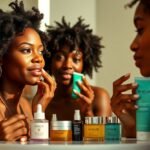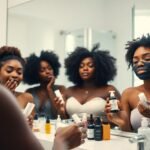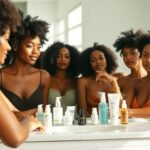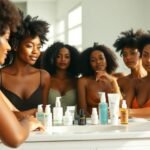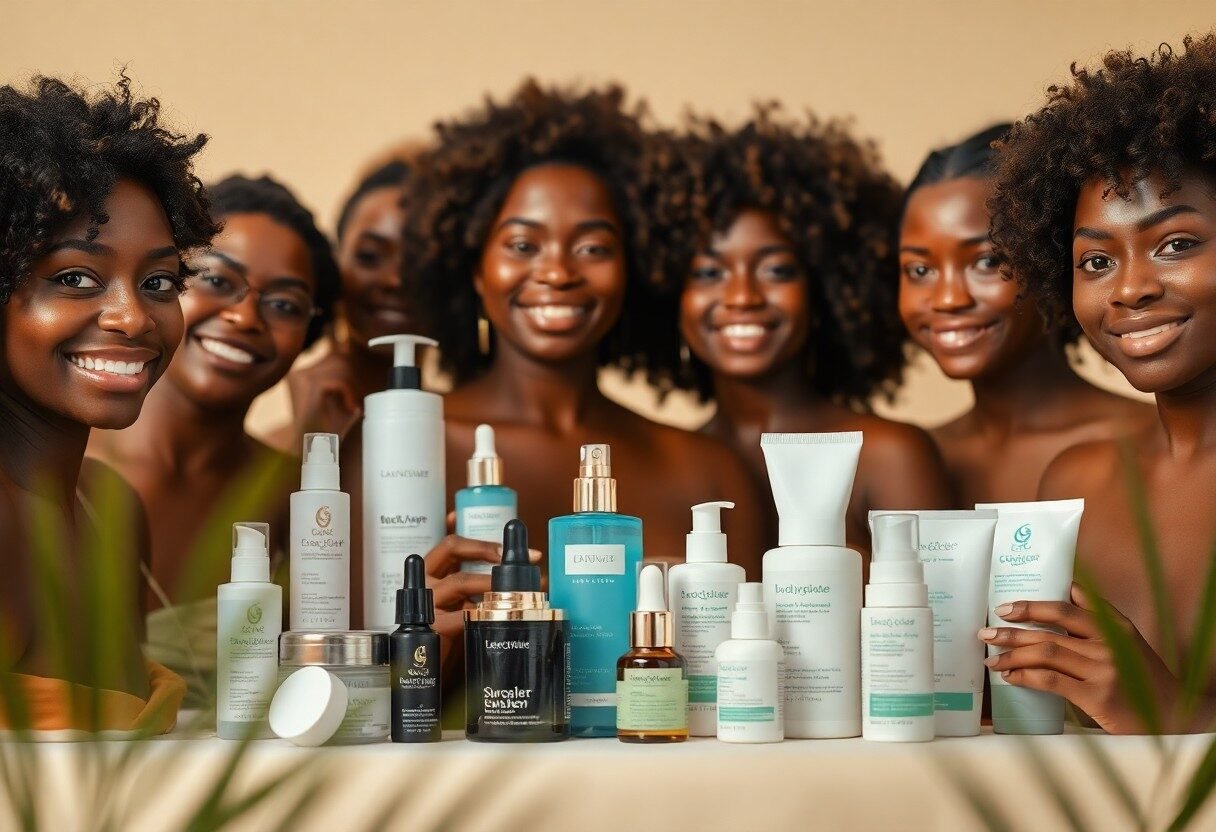
Most women of color face unique skin challenges, and I understand how important it is to have the right products in your skincare routine. From hyperpigmentation to dryness, your skin deserves the best care tailored specifically for its needs. In this post, I will guide you through the crucial products that will keep your skin healthy, radiant, and glowing. Whether you’re tackling uneven skin tone or simply want to maintain your natural beauty, I’ve got you covered with the knowledge you need to achieve your skincare goals.
Key Takeaways:
- Moisturization is necessary; look for products that contain shea butter, jojoba oil, or glycerin for optimal hydration.
- Sun protection is a must, even for darker skin tones; choose a broad-spectrum sunscreen with at least SPF 30.
- Adequate exfoliation is important to prevent dullness; consider chemical exfoliants like AHAs or BHAs.
- Be aware of common skin issues such as hyperpigmentation; incorporate vitamin C and niacinamide in your skincare routine to help brighten skin.
- Test products for sensitivity; patch testing can help avoid allergic reactions and ensure compatibility.
- Hydration from within is necessary; drink plenty of water and eat a balanced diet rich in antioxidants and vitamins.
- Consult with a dermatologist who understands the unique needs of Black skin for personalized skincare recommendations.
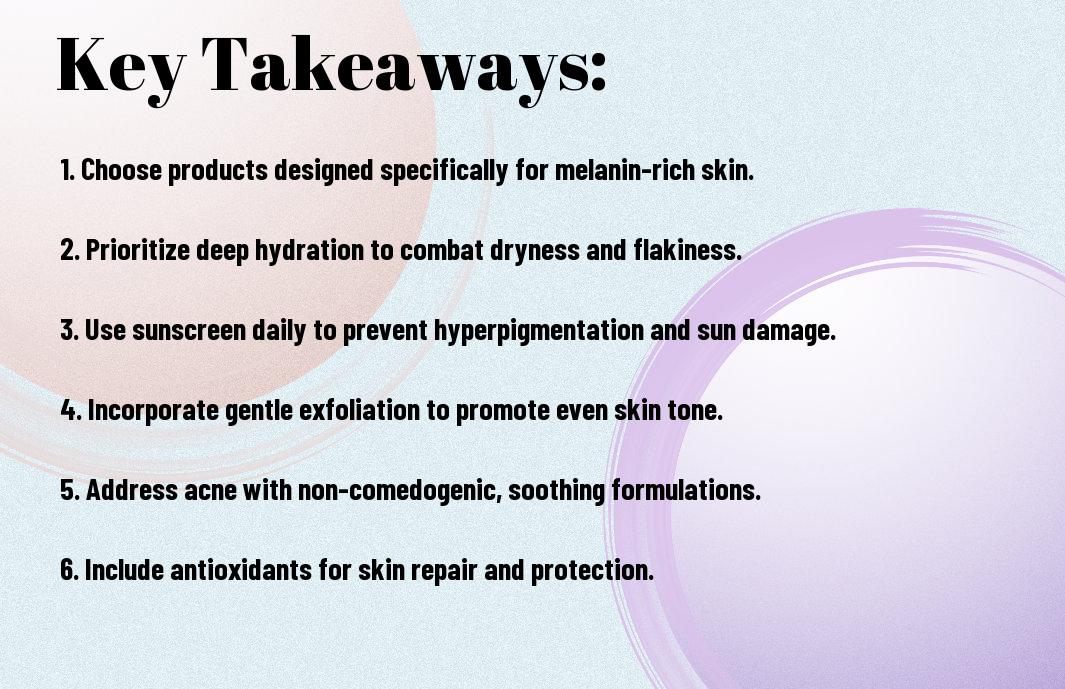
The Unique Composition of Black Skin
Black skin possesses distinct characteristics that set it apart from other skin types. It typically has a thicker dermis and a higher density of collagen, which contributes to its durability and resilience. This unique composition not only influences the overall texture and appearance but also impacts how skin responds to various environmental factors. Additionally, the natural oil production in Black skin can often lead to a glowing complexion, making proper skin care necessary to harness its full potential.
Melanin: The Protective Barrier
Melanin is the key pigment responsible for the rich color of Black skin, acting as a natural protective barrier against UV radiation. This pigment not only helps to reduce the risk of sun damage but also plays a role in preventing premature aging. Darker skin has a greater melanin concentration, which offers some level of protection; however, this does not completely eliminate the need for sun protection in your skincare routine.
Common Skin Conditions and Concerns
While Black skin is unique, it is also prone to specific conditions. Issues such as hyperpigmentation, keloids, and acne can arise, often due to its structure and response to inflammation. Although melanin provides some protection, it can also complicate healing processes, making it vital to understand these concerns for effective treatment.
Hyperpigmentation is particularly common, with conditions like post-inflammatory hyperpigmentation resulting from acne or injuries to the skin. Keloids, which are raised scars that can develop at the site of an injury, are more prevalent among those with darker skin due to the increased collagen production during the healing phase. Acne can also leave visible dark spots, making it critical to approach skincare and treatment with the awareness that healing may take longer and may require specialized products designed for melanin-rich skin. Educating yourself about these issues ensures you can implement an effective skincare regimen tailored to your specific needs.
Essential Skincare Ingredients for Luminous Skin
For luminous skin, I rely on key ingredients that work synergistically to brighten and hydrate. Vitamin C is a powerhouse antioxidant that helps to reduce dark spots while promoting even skin tone. Hyaluronic Acid draws moisture into the skin, leaving it plump and radiant. Niacinamide aids in strengthening the skin barrier and improves elasticity, while alpha hydroxy acids (AHAs) gently exfoliate, revealing fresh, glowing skin underneath. Incorporating these ingredients into your routine can transform your complexion and enhance your natural beauty.
Moisturizers and Emollients
The right moisturizer can make all the difference in your skincare routine. Opt for products containing shea butter, which deeply penetrates the skin, providing rich hydration without clogging pores. Additionally, jojoba oil is an excellent emollient, mimicking your skin’s natural oils for a balanced feel. Combining these nourishing ingredients helps to lock in moisture and deliver a dewy, healthy appearance that enhances your natural glow.
Sunscreens: The Misunderstood Necessity
Many people still overlook sunscreen, mistakenly believing melanin offers sufficient protection against UV rays. In reality, Black skin is still susceptible to sun damage, which can lead to hyperpigmentation, premature aging, and even skin cancer. Incorporating a broad-spectrum sunscreen with an SPF of at least 30 into your daily skincare routine not only safeguards your skin but also promotes an even skin tone. Choose formulations that cater to darker skin tones, ensuring they won’t leave a white cast while offering effective protection.
Despite the misconceptions, daily use of sunscreen is fundamentally important for maintaining the health and vitality of your skin. Many options now come tinted or are designed for a variety of complexions, ensuring they blend seamlessly for a variety of skin tones. Sunscreens not only shield against UVA and UVB rays but also prevent post-inflammatory hyperpigmentation that can occur after breakouts or other skin concerns. By making sunscreen your go-to product, you simultaneously invest in your skin’s present and future health.
Tailoring Your Routine: Morning and Night Regimens
Creating an effective skincare routine requires a tailored approach for both morning and night. Each regimen serves distinct purposes, ensuring your skin remains protected during the day while allowing it to repair and rejuvenate overnight. Understanding the right products will maximize the health of your skin, addressing specific needs to reveal that luminous glow we all desire.
Morning Essentials for Protection
Morning routines focus on shielding your skin from environmental aggressors. Start with a gentle cleanser to remove any overnight buildup, then apply a nourishing serum packed with antioxidants like vitamin C. Follow this with a high-quality, broad-spectrum SPF of at least 30 to combat UV exposure and prevent hyperpigmentation, a common concern for black women. Finish off with a light moisturizer to lock in hydration and create a smooth canvas for makeup if you choose to wear it.
Evening Rituals for Repair
Evening skincare rituals emphasize restorative processes while your body is at rest. Cleansing thoroughly is vital to remove impurities accumulated throughout the day, followed by a more intensive treatment such as a retinol or AHA, promoting cell turnover and combating signs of aging. A rich moisturizer or oil can be applied to seal in moisture and support skin barrier recovery during the night, enhancing the overall radiance of your complexion.
For repair, I incorporate products rich in ingredients like hyaluronic acid and peptides, which deeply hydrate and stimulate collagen production. Additionally, I love adding a targeted treatment for specific concerns like dark spots or uneven texture. This concentrated evening ritual not only helps my skin recover but also prepares it for a fresh start each morning. With consistent evening care, the skin feels smoother, tighter, and more vibrant by the time I wake up, making all the difference in achieving a healthy glow.
The Role of Diet and Hydration in Skin Health
Your skin reflects what you eat and drink, making diet and hydration foundational to maintaining its health. Consuming a balanced diet rich in antioxidants, vitamins, and healthy fats provides your skin with the nutrients it needs to thrive. Foods high in omega-3 fatty acids, like salmon and walnuts, help maintain skin elasticity, while vitamin C-rich foods, such as citrus fruits, promote collagen production for a youthful appearance.
Nutrients that Nourish
Specific nutrients play a significant role in nourishing your skin. Incorporating plenty of fruits and vegetables into your diet ensures you receive antioxidants, which combat free radicals that can damage skin cells. Vitamins A, E, and K are vital for repair, moisture retention, and overall skin health. Additionally, biotin is vital for maintaining a healthy complexion, often found in eggs, nuts, and leafy greens.
The Power of Water
Hydration directly impacts skin appearance and texture. Drinking adequate water daily helps flush out toxins and supports cellular function, keeping your skin looking plump and radiant. Aim for at least 8 glasses (about 2 liters) a day, and adjust based on activity levels and climate. Proper hydration also aids in maintaining your skin’s moisture barrier, preventing dryness and flakiness that can often accompany neglecting your water intake.
Incorporating water-rich foods, such as cucumbers, oranges, and berries, can further enhance your hydration strategy. Dehydrated skin often leads to increased oil production and can exacerbate issues like acne and uneven texture. I’ve noticed a marked difference in my skin’s glow and resilience when I prioritize drinking water consistently. You may also recognize signs of reduced puffiness and a more even complexion when you keep hydration at the forefront of your skincare regimen.
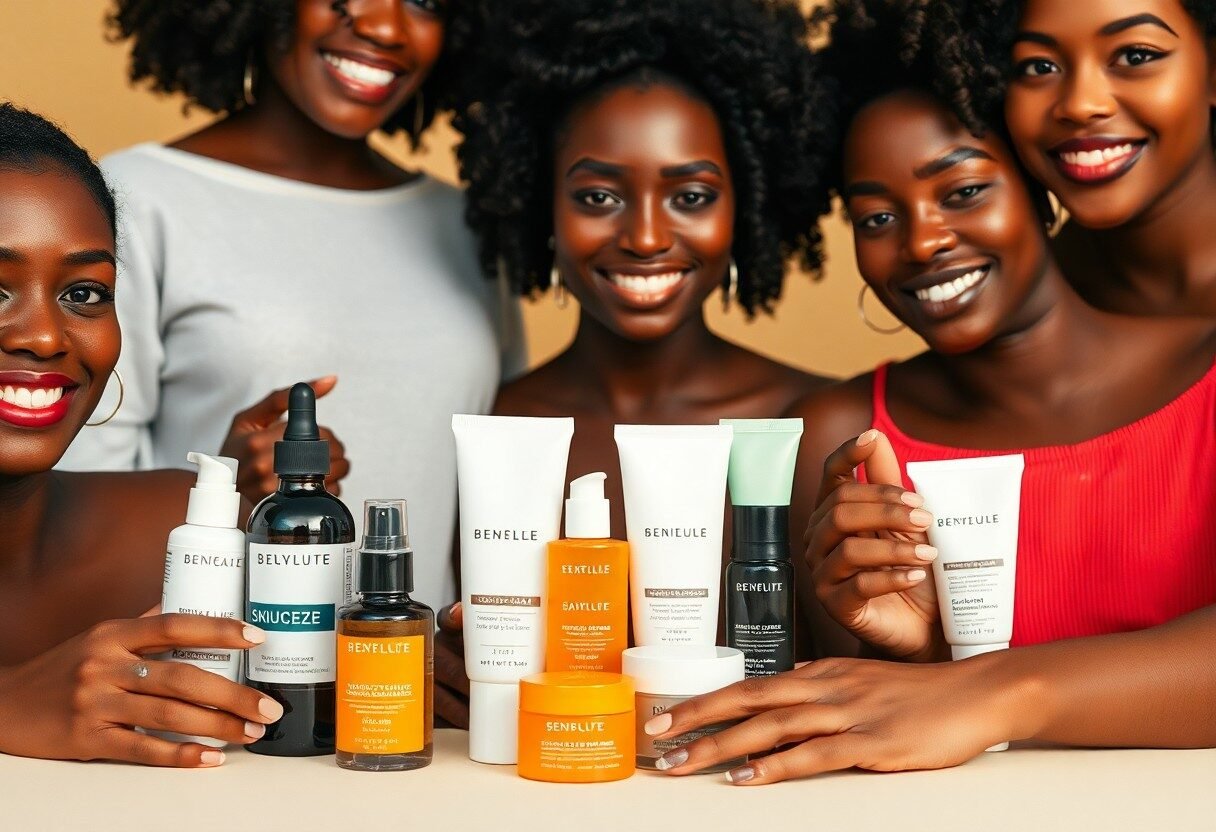
Cultural Practices and Their Impact on Skincare
Delving into the rich tapestry of cultural practices reveals how they shape our skincare routines. Generations of Black women have passed down wisdom about natural ingredients that defend against dryness and environmental stressors. For instance, the use of natural oils and butters like shea butter or coconut oil traces back to ancestral rituals, with these products celebrated not only for their hydrating properties but also for connecting us to our heritage.
Traditional Remedies and Modern Science
Combining traditional remedies with modern science creates a harmonious approach to skincare that honors our past while embracing innovation. Ingredients like aloe vera and honey, often used in home remedies, have been extensively studied and incorporated in today’s formulations for their healing properties and effectiveness in boosting skin health.
Empowering Stories from the Community
The stories emerging from our community highlight strength and resourcefulness in skincare choices. From sharing how DIY masks using natural ingredients transformed their skin to discussing the importance of self-care rituals in boosting confidence, these narratives reveal a collective commitment to embracing our unique beauty. They also serve as inspirations to fortify a sense of belonging and connection among Black women navigating the skincare landscape.
Each empowering story adds a layer to our understanding of skincare that transcends mere product choices. Women recount how using family recipes for face masks or embracing their natural skin texture became pivotal moments in their journey to self-acceptance. These shared experiences reflect a community that uplifts one another, and they remind me of the strength found in authenticity and tradition. Celebrating these narratives not only honors our heritage but also inspires future generations to take pride in their skincare practices and cultural identity.
Summing up
Presently, I believe that understanding and addressing the unique skin care needs of black women is important for achieving healthy and radiant skin. By incorporating the right products, including moisturizers, sunscreens, and serums tailored for melanin-rich skin, you can enhance your complexion while preventing common issues like hyperpigmentation and dryness. It’s about finding what works best for you personally and taking the time to invest in your skin. With patience and informed choices, your skin can truly reflect its natural beauty.
FAQ
Q: What are the basic skin care vitals for Black women?
A: The basic skin care vitals include a gentle cleanser, a good moisturizer, sunscreen, and targeted treatments like serums for specific concerns such as hyperpigmentation or acne. It’s important to choose products that cater to your skin type, whether oily, dry, or combination.
Q: Why is sunscreen important for Black women’s skin?
A: Sunscreen is vital because it protects against UV rays, which can cause skin damage and increase the risk of skin cancer, even in darker skin tones. Additionally, using sunscreen prevents further darkening of hyperpigmented areas, ensuring an even skin tone over time.
Q: What ingredients should I look for in moisturizers?
A: It’s beneficial to look for ingredients such as shea butter, hyaluronic acid, glycerin, and ceramides, which provide hydration and help maintain the skin barrier. For added nutrition, consider moisturizers with natural oils like jojoba oil and argan oil, which are especially effective for Black skin.
Q: How should I treat hyperpigmentation in my skin?
A: Treating hyperpigmentation often involves using products with active ingredients like vitamin C, kojic acid, or niacinamide, which help to brighten the skin and even out the tone. Additionally, incorporating retinoids can improve cell turnover and diminish dark spots over time.
Q: Is it necessary to have a separate night skincare routine?
A: Yes, a night routine is important because it allows your skin to repair and regenerate while you sleep. During this time, you can use products with stronger active ingredients, like retinol or exfoliating acids, without the worry of sun exposure.
Q: How can I address dryness or ashy skin associated with Black skin tones?
A: To combat dryness, it’s vital to use rich moisturizers that provide a barrier against moisture loss. Incorporating products containing oils and butters, along with regular exfoliation, will also help slough off dead skin cells and retain moisture, ensuring a more hydrated appearance.
Q: Should I seek professional advice for my skin care routine?
A: Seeking professional advice, such as consulting a dermatologist or an esthetician, can be beneficial, especially if you experience persistent skin issues or have specific concerns. They can help tailor a skincare regimen suited to your unique skin type and needs.

